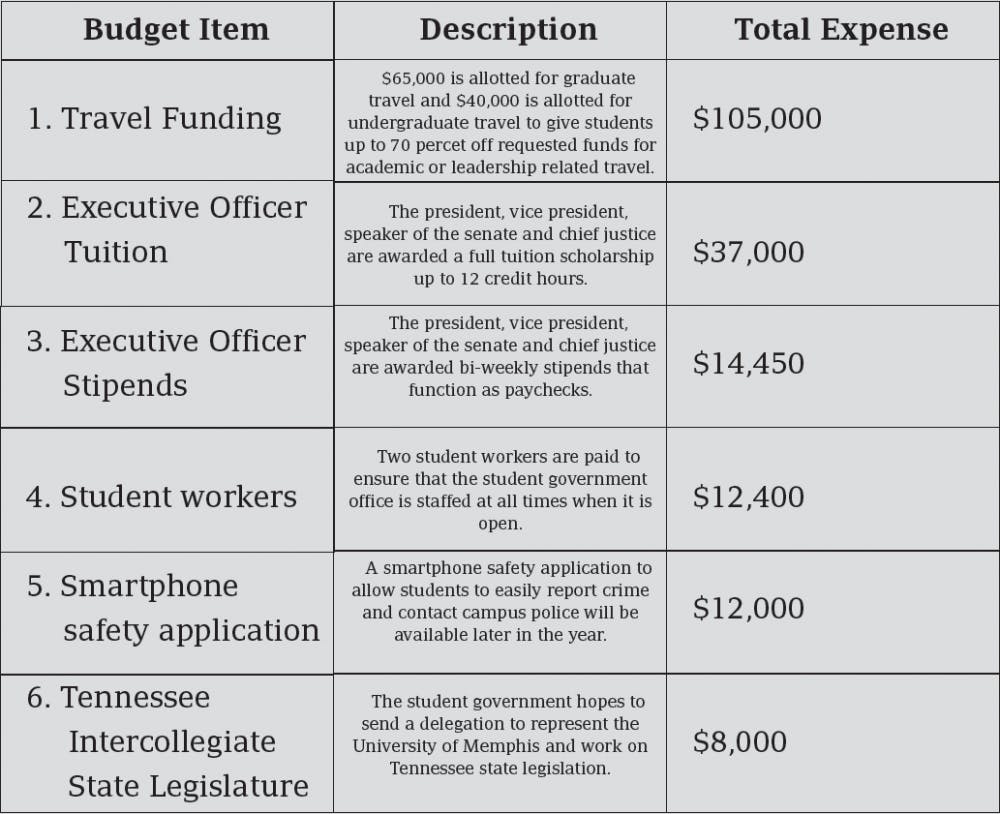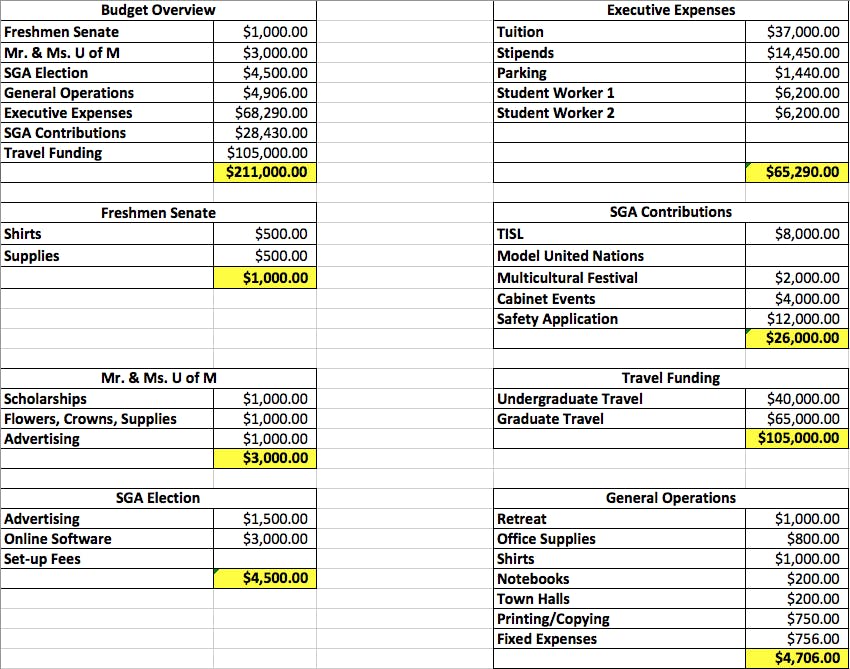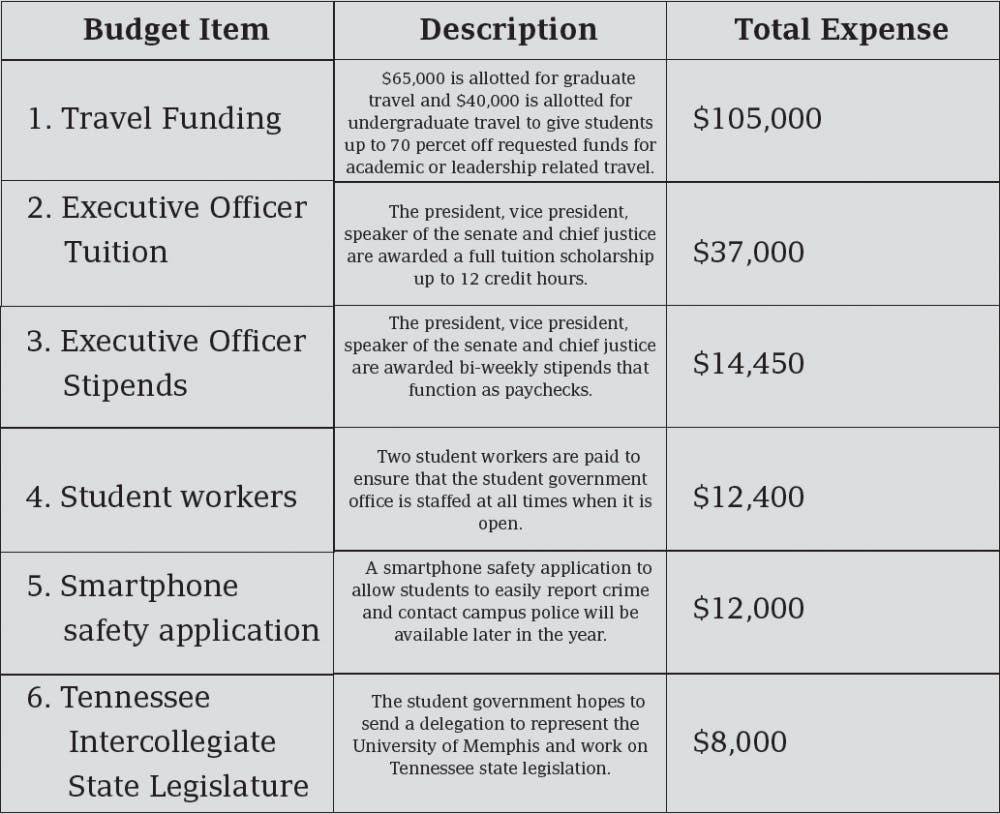The Student Government Association unanimously passed its budget for the 2016-2017 school year, which totaled about $210,000.Â
SIX MOST EXPENSIVE ITEMS ON THE STUDENT GOVERNMENT BUDGET

The budget was slightly modified from last year’s. Funds for the Model United Nations were cut, since there is no longer an active chapter on campus. Cabinet and general operations funding were also decreased.Â
The top spending items on the budget remained largely the same from last year.Â
Student travel still received the most funding, with $105,000 allotted for undergraduate and graduate travel. Any current student or student group may apply for a travel reimbursement for an academic or leadership related trip. The student government can approve up to 70 percent of the requested amount. If the funding is not all used, it is deposited back into the student fee fund, where it is reallocated to other campus programs, according to Natalie Moore, vice president of student government.Â
Â
Â
FULL STUDENT GOVERNMENT BUDGET 2016-2017

Also appearing on the budget is tuition for student government executive members. The president, vice president, speaker of the senate and chief justice all receive a full tuition scholarship up to 12 credit hours, totaling $37,000. The scholarship can be combined with any other U of M scholarships an officer may have.Â
“Truthfully, I didn’t run for SGA president for the tuition,†Jared Moses said. “I already had a scholarship, but we all work way more than the required hours. I think it’s just a nice thank you for all of the work the officers do.â€Â

Jared Moses, student president, and Natalie Moore, student vice president.
The executive officers also receive parking in the Zach H. Curlin parking garage and are paid biweekly. The parking and pay make up $15,890 of the total budget.Â
In times when officers are not available to work, $12,400 is allotted for two student workers to staff the student government office.Â
“We want to make sure that someone is in the office at all times,†Moses said. “We want to be available to all students.â€Â
In another service to students, funding for a smartphone safety application was also approved. Last year, the funding was used for development of the application. This year, $12,000 will be used for its launch. The application will be available to students later in the year as a streamlined way to contact campus police.Â
About $8,000 was allotted to send a delegation of U of M students to the Tennessee Intercollegiate State Legislature, a state-sponsored student government that contributes to state legislation.Â
Student government has also restructured money used for initiatives that the president, vice president and committees take outside of the senate and judicial branch, according to Moore.Â
“In the past, we haven’t had breakdowns of cabinet money,†Moore said. “Last year, that money was hardly touched. Now, we’ve restructured it to give it more importance. We cut what wasn’t needed and really delegated it.â€
This year, student government plans to use the money for numerous campus events, including a voter registration drive, events held with the Office of Multicultural Affairs and a collaboration dinner with registered student organization presidents.Â
Student government does not have an allotment specified for independent senate spending.Â
“The senate’s job is not to program,†Moore said. “The senate’s role is to write legislation to make a recommendation to the university in hopes that the money will come from other departments in the university. If the senate decides on something that they want to fund this year, that’s something we’ll definitely need to budget for in the future.â€Â
This year’s budget was reviewed by Moses and Moore before they presented it to the Student Fee Committee, which is comprised of both students and faculty members.Â
The committee approved a fixed amount for student government. Moses and Moore made adjustments to the original budget to ensure it would stay within that amount before proposing it to the Student Government Association, where it was passed.Â




